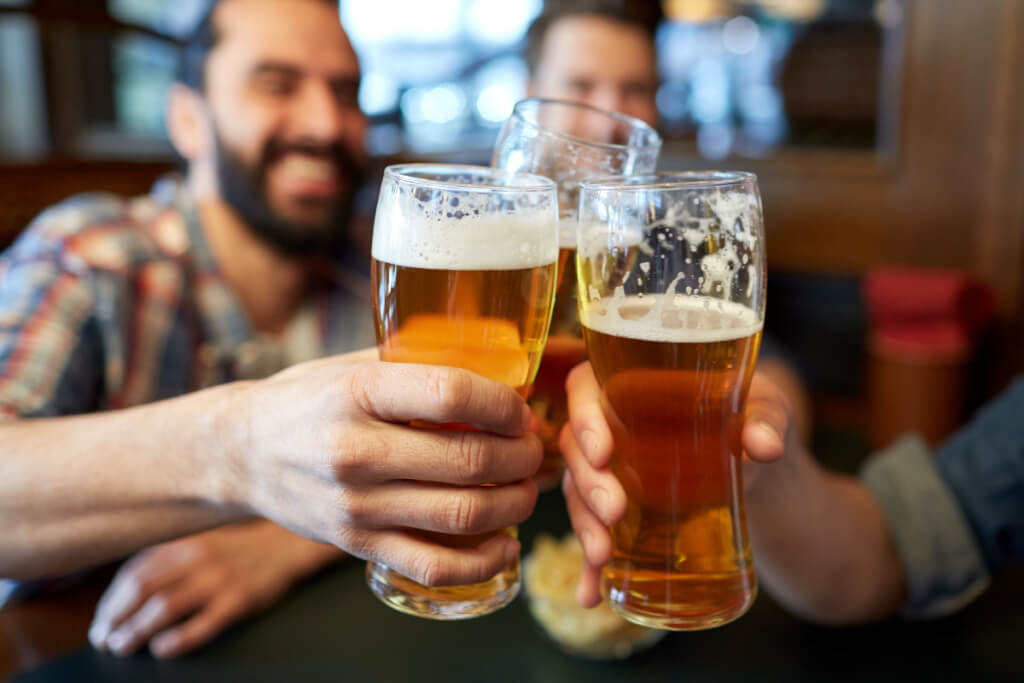Advertising Disclosure
What happens to your health when you stop drinking alcohol

“How will quitting drinking affect my health?” If you’ve every asked yourself that question, you may be considering quitting drinking for a short period or the long term. Many of us indulge in drinking alcohol regularly, and partaking is healthy in moderation. Still, some of us consider cutting back on our drinking for any number of reasons. Whatever your reasons for doing so, abstaining from alcohol for even a short period of time can have beneficial effects on your physical health.
How will quitting drinking affect my digestive health?
Alcohol affects your digestive system. The more you drink, the more damage it can do to your gastrointestinal system. Not only might it damage to your stomach and intestines, but excessive consumption of alcohol can cause harm to every organ in your digestive system.
Acid reflux, for one example, is a common side effect of drinking. As the alcohol irritates the digestive system, it causes the stomach to produce more acid that usual. On top of the discomfort, this can develop into gastritis. Removing or reducing the amount of alcohol you consume lowers the chances of developing these issues.
How will quitting drinking affect my skin?
Skin care is a crucial part of many of our self-care routines. But what you may not realize is that, if your skin condition isn’t where you want it to be, alcohol consumption could be the reason why. Alcohol affects the skin in a variety of different ways including causing acne, dehydration and inflammation.
The sugar found in wine and cocktails goes hand in hand with breakouts, and the dehydration of the skin that alcohol causes makes fine lines and wrinkles appear more prominent. When it comes to inflammation, celebrity aesthetician Joshua Ross calls alcohol comsumption, “the second major cause of skin aging.”
“What alcohol does is bring the blood up to the tissue causing inflammation so that’s why it’s harmful to the skin,” according to Ross. “That can manifest in blotchiness, redness, ruddiness and dehydration.”
Your skin will improve the longer you hold off on drinking. Giving up alcohol even temporarily offers your skin a reset, a chance to breathe, rehydrate and restore your natural, healthy glow.
How can abstaining affect my sleep?
Did you know alcohol can ruin your ability to get a good night’s sleep? It’s true: Alcohol use and insomnia are intertwined. Alcohol affects your sleep pattern, and though some believe drinking makes it easier for them to fall asleep, it actually does the opposite and makes it even harder to stay asleep throughout the night.
Have you ever noticed that you keep waking up during the night after an evening of drinking? This is because alcohol reduces the quality of sleep, shortening the time your spend in REM and slow-wave sleep.
Cut back on drinking and you’ll see your sleeping pattern improve. Of course, just like anything else, the longer you refrain from drinking, the greater the sleep improvements will be.
How might my weight change if I quit?
If you’re a frequent drinker, gaining weight is almost inevitable. Alcohol is high in calories, and it also heightens your appetite. Depending on how much you consume it, it can play a big role in your weight.
Dr. Rekha B. Kumar, medical director of the American Board of Obesity Medicine, explained how refraining from alcohol may help you lose weight.
“If heavier drinkers remove alcohol for a longer period of time, they might see weight loss, improvement in body composition, less stomach fat, improvement in triglycerides (one of the fat particles in the blood),” Dr. Kumar said.
It is important to note that anyone’s choice to cut out alcohol should not be based on a goal of losing a ton of weight, but more about achieving a healthy weight. With its empty calories, alcohol deprives your body of useful and necessary nutrients.
How might quitting drinking affect my mental health?
There is no doubt alcohol can affect mental health. And many people turn to alcohol as a crutch, which it can make depression, anxiety and other mental health issues much worse.
For many, drinking alcohol calms feelings of anxiety, nervousness or fear. It is often used to gain courage, or as an escape. But most times, drinkers who self-medicate with drinking don’t take into account the negative effects alcohol has on mental health, or they ignore those effects.
Even casual drinkers can experience mental fog, anxiety and mood changes. Alcohol also “overloads the brain with dopamine,” which gives us a sense of pleasure and joy. This is why those who are used to heavily drinking can suffer from depression when they stop: The lack of dopamine makes them crave alcohol. But quitting drinking helps the brain restore its natural function in the long term.
Alcohol also gives us a boost of serotonin that can actually cause a long-term decrease of serotonin, which in turns leads to a higher chance of depression. Removing alcohol from the equation allows for serotonin production to increase normally.
These are some of the several benefits that come from quitting drinking. If you’re thinking about making this choice permanently or short-term, these are benefits you can and should take into consideration when deciding if this decision is right for you.





